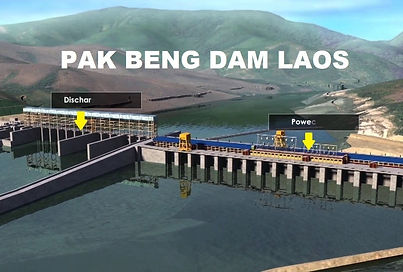
This review is focused on the socio-economic assessment of site-specific and transboundary impacts of the Pak Beng Hydropower Project (PBHPP). This review is part of the PNPCA and guided by the 1995 MRC agreement, which requires Member Countries make every effort to avoid, minimise and mitigate harmful effect on the Mekong River System. This review documents the process of establishing whether the social, environmental and transboundary information submitted for prior consultation by the Lao PDR authorities (LNMC) is sufficient to reliably support the MRC Joint Committee with their deliberations, and whether measures to further mitigate any potential impacts on the shared river system can be taken.
The review is focussed on Article 7 of the 1995 Mekong Agreement; “The prevention and cessation of harmful effects”. Which states that Member Countries “should make every effort to avoid, minimise and mitigate harmful effects”. The terms; significant impact, avoid, minimise and mitigate adverse impacts, substantial damage, reasonable and equitable use, and viable and

reasonable measures, therefore have special meaning and interpretation in the context of the PNPCA process and the 1995 Mekong Agreement. Ultimately, it is the purview of the JC to decide on whether the PBHPP crosses any of these thresholds.
The review process combines an existing framework for the review of hydropower assessments for Lao PDR with the outputs from a scientific workshop that identified a comprehensive list of possible primary, secondary and tertiary impacts of hydropower in the Mekong. In addition, the review approach was presented to a stakeholder forum and feedback recorded to further refine the set of review questions.
The review framework (see Annex A) was designed and consolidated in four steps to suit the context of the PBHPP (and other Mekong mainstream dams).
-
In a first step the review questions set out in the IFC Cumulative Impact Assessment framework (IFC 2016) were reduced to ensure transboundary and cumulative impacts are sufficiently captured to assist the Joint Committee deliberations.
-
In a second step MRC’s RSAT hydropower sustainability criteria were considered.
-
In the third step, revisions based on the results from an independent expert panel that identified a range of potential impacts of hydropower projects in the Mekong.
MERFI implemented under the GIZ-MRC cooperation programme the evaluation of the socio-economic assessment of the Pak Beng hydropower project as part of the Procedures for Notification, Prior Consultation and Agreement (PNPCA) of the Mekong River Commission (MRC).

-
All three components were combined and presented at a stakeholder workshop, which defines the fourth step. Several local impacts were added to the scope in response to stakeholder feedback.
These steps translated into a disaggregation and specification of several additional questions in the IFC framework. The resulting review framework is comprised of set of eight Review dimensions comprising 89 questions to systematically interrogate the transboundary socio-economic impact assessment of hydropower dams in the Mekong. Comprehensive assessments should analyse what effects are likely to occur due to the PBHPP and to what extent. The review dimensions were framed as a series of questions to investigate principles of design, data quality, stakeholder engagement, evidence for impact analysis and mitigation measures, opportunities for benefit sharing and the provision of non-technical summary.
